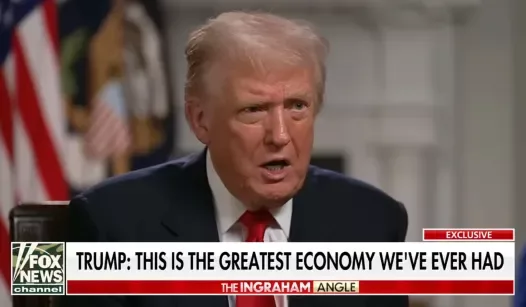Former President Donald Trump has made headlines once again, this time for his dismissal of economic concerns that are increasingly weighing on the minds of voters. While he has consistently maintained a confident stance on the economy, the reality for many Americans tells a different story. As inflation persists and job stability remains uncertain, the potential consequences of ignoring these issues could be significant for his political future.
In recent months, economic anxiety has surged among the American public. Rising prices for everyday goods, fluctuating gas prices, and concerns about job security have left many feeling uneasy. Yet, Trump’s approach has been to downplay these worries, insisting that the economy is fundamentally strong and that any issues are merely temporary blips. This attitude, while perhaps reassuring to his core supporters, risks alienating a broader electorate that is grappling with real economic challenges.
The political landscape in the United States is complex, and voters are increasingly looking for leaders who acknowledge their struggles. Historically, economic performance has been a key determinant in election outcomes. When the economy falters, incumbents often face the wrath of voters who feel the pinch in their wallets. Trump’s previous presidency was marked by a strong economy, but the current climate is markedly different, and the electorate’s mood has shifted.
Ignoring the economic realities that many Americans face could prove detrimental for Trump as he contemplates another run for the presidency. Political analysts suggest that dismissing these concerns may come across as out of touch, especially among swing voters who are crucial for electoral success. The ability to resonate with voters on economic issues is paramount, and a failure to engage with these topics could lead to significant political repercussions.
Moreover, Trump’s narrative around the economy contrasts sharply with the experiences of many individuals and families. For instance, wages have not kept pace with inflation, and while unemployment rates have dropped, many workers are still feeling the effects of a post-pandemic recovery that has not been equitable. By failing to acknowledge these disparities, Trump risks being seen as disconnected from the everyday realities of American life.
In addition to the economic challenges, Trump faces another hurdle: the evolving political landscape. The rise of new political movements and the increasing importance of issues such as climate change, healthcare, and social justice are shifting the focus away from traditional economic arguments. Voters are looking for comprehensive solutions that address a range of concerns, not just those related to the economy. By narrowing his focus and dismissing broader anxieties, Trump may miss opportunities to connect with a diverse voter base.
As Trump navigates this complex terrain, he must also contend with a growing field of potential challengers, both within the Republican Party and from the opposition. Candidates who are able to articulate a clear understanding of economic issues and demonstrate empathy towards voters’ concerns may gain traction. This means that Trump must carefully consider how he communicates his economic message and whether it aligns with the experiences of the average American.
In summary, dismissing economic anxiety could be a risky strategy for Trump as he considers his political future. The stakes are high, and the lessons of history remind us that economic issues can make or break a presidency. As voters grapple with their financial realities, they are looking for leaders who not only understand their struggles but also offer viable solutions. For Trump, the challenge will be to balance his confident rhetoric with a genuine acknowledgment of the economic concerns that are shaping the electorate’s mood. Failure to do so may not only jeopardize his chances for re-election but could also reinforce the perception that he is out of touch with the American people.
